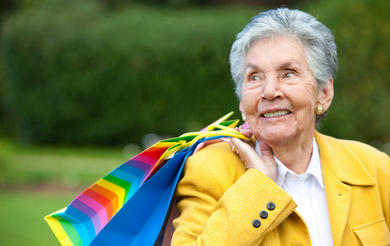Skills for Care has published a new framework to support social care workers in providing care to older lesbian, gay, bisexual, trans, queer (LGBTQ+) people.
To create this, the University of Strathclyde, the Pride in Ageing programme and LGBT Foundation have all collaborated with Skills for Care, alongside input from older members of the LGBTQ+ community.
The New Guidelines
The comprehensive framework comprises a detailed background on LGBTQ+ issues and awareness, along with an exploration of health and wellbeing issues later in life.
This is an area of social care practice that has not been developed as well as it should have been, not least because of reluctance in discussing areas of sexuality and gender identity.
The main topics covered include:
- Research into LGBTQ+ inequalities
- Information on providing personalised care and support covering topics of trans-affirmative care
- Intersectionality
- Supporting people with dementia or HIV
- Understanding intimacy and sexuality later in life
- Recommendations for leadership, education, and service development to continue to improve care and support in this area
This framework is designed to be used by social care employers, employees, training providers, regulators, commissioners, policymakers, and other stakeholders to enhance their understanding of LGBTQ+ issues, support their colleagues, and create learning programs that will enable teams to better support LGBTQ+ individuals in their later years.
Elder members of the LGBTQ+ Community
Individuals belonging to an older demographic may have harboured reservations about disclosing their sexual preferences or gender identity. This is especially true for those who were raised during a time when homosexuality was considered a criminal offence or was not as widely accepted, and prior to the enactment of laws protecting transgender rights. Despite advancements in the legal status of LGBTQ+ communities and greater equality in recent times, many older members of this community still suffer from the effects of persistent discrimination .
For many older members of the LGBTQ+ community, the effects of persistent discrimination can still have a significant impact on their lives. It's important for caregivers to be mindful of these issues and to provide support that is respectful and supportive .
It is imperative that care workers possess the knowledge, skills, and values necessary to confidently support LGBTQ+ individuals in all aspects of their lives, such as coming out, personal relationships, support networks, and legal rights. There are estimated to be upwards of 120,000 individuals aged 65+ in the UK alone who identify as part of the LGBT+ community, and this is set to grow further.
Our Equality, Diversity and Inclusion Course
Our CPD-Accredited and Skills for Care endorsed Equality, Diversity and Inclusion course incorporates these new guidelines and will teach learners about supporting the needs of LGBTQ+ people and to recognise the equal standing that LGBTQ+ people have.
This training applies to all health and social care workers that work in settings such as Care Homes, Day Centres, or supporting an individual in their own home. This also applies to hospital staff at health care assistant level, unpaid and voluntary workers.
Some of the topics the course will cover include:
Learn more about at the Equality, Diversity and Inclusion course here.
Get In Touch
BVS Training has a range of over 70+ video-based social care courses.
Talk to our
team on 0345 644 2866
Email us on:
info@bvs.co.uk


